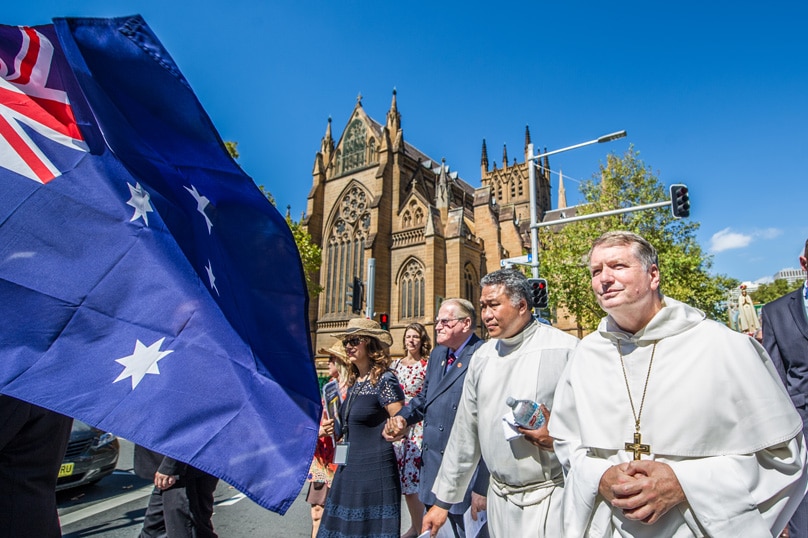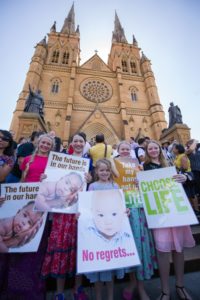
Some years ago I was part of a Channel 4 TV program in Britain, a panel discussion about the new genetics. I was asked what I thought about prenatal testing. I explained that it was fast becoming a ‘search and destroy’ technique used to ensure that the handicapped never saw the light of day. But before I could explain myself fully, another panellist – who was a well-known embryo experimenter – jumped in, accusing me of thinking all abortion is a sin.
“Of course all abortion’s a sin,” piped up a third panellist – the famous Australian-born feminist, academic and provocateur, Germaine Greer. As someone who’d been through the experience of abortion and subsequent infertility, she spoke with some authority and passion. And as a former convent schoolgirl she was comfortable using the politically incorrect tag ‘sin’. Every abortion, she thought, is a sin, not just a challenge but a moral evil, and women know that in their heart of hearts …
Abortion is not a subject I like to raise from the pulpit. No priest does. Yet I know that it is the hard reality for many Australian women and so I do raise it from time to time. We all know and love someone who has had an abortion, whether we realise it or not, because we are talking about at least one-in-four Australian women, many of whom submit to the procedure because they feel that they have no other choice. There is much that could be said about that. The causes and effects. The individual tragedies. The failure of our society to offer enough real alternatives.

Apart from appearing on TV with the young Father Fisher, Germaine Greer is famous for her books such as The Female Eunuch (1970) and, more recently, The Whole Woman (1999). And in that latter book she pointed out that the cry of the abortion-on-demand movement was “every child a wanted child”; but, she said, they forgot to cry also “every abortion a wanted abortion”. She believed that the sad reality for many women is that they are pressured into abortion, or abandoned into abortion, by their partners, family, friends, college or community.
UK researchers found 30 per cent of women having second abortions were in abusive relationships with a statistical increase with three or more abortions. And for that we must all say sorry. Sorry to the millions of babies who have been lost. Sorry to the thousands of vulnerable women left so unsupported then and who are now hurting. And sorry to so many others damaged by the abortion epidemic while our community did little or nothing about it.
This morning we heard another of the long and wonderful Lent Gospels used to prepare the catechumens for Easter. The Woman at the Well in last Sunday’s Gospel first called Jesus “you Jew”, then “Sir, Prophet”, and finally came to realise that he was “the Messiah, the One who knows everything about me”.
The Man at the Pool in this Sunday’s gospel makes similar progress from identifying Jesus as “the man Jesus who touched my eyes” to “a prophet… No sinner, but a man from God” to finally acknowledging Him as “the Son of man” and worshipping Him. The catechumens preparing for baptism or reception into the Church at Easter realise that these stories are their stories; and the Church, accompanying them and with arms wide-open ready to receive them at Easter, realises that these stories are her stories as well.
Jesus came into this world that the blind might see and yet many of the powerful of his day refused to see. Exasperated He cried out, “None are so blind as those who will not see” to which the authorities responded, “We are not blind: the Law is on our side”. “So much the worse for you,” Jesus replied, “If you were truly morally colour-blind no-one could blame you for your failures; but since you insist you can tell right from wrong, you must be held responsible.” An age such as ours, that understands embryology better than ever before, that can see into the womb through ultrasound and even into human life at its very beginnings; an age such as ours, that knows the importance of respect (and dangers of disrespect) for the dignity of every human person and of human rights, of which the right to life is logically first; an age such as ours, so affluent, with so many options, so able to help desperate mothers: this is an age that closes its eyes and turns the other way, when issues as difficult as unplanned pregnancy and post abortion grief present themselves. As recently as 2011, the British Journal of Psychiatry published research concluding that there was an 81 per cent increased risk of mental health issues in women who have had an abortion, yet still women are told abortion is perfectly safe and society is told we need more of it.
One reason our community closes its eyes to the tragic plight of these women is that to face the grim reality of abortion and the rights of children and women will require a deep moral conversion for our whole community, and that is hard, especially in an age that valorises autonomy, doing your own thing, never judging, least of all yourself. For Catholics, too, there is always the human desire to fit in, not to seem to be harsh, judgmental, fanatic. And Catholic or not, as I said at the beginning, we all know and love women who have had abortions.
So how are we to be eyes-wide-open Christians without being finger-waggers? Pope Francis suggests we begin by committing in our heart of hearts to be true “witnesses and diffusers of the culture of life”. Then we must help our neighbours to recognise the transcendent dimension of human life, the imprint of God’s creative work, from the first moment of conception. That can take some heroism, as pro-life evangelisation goes against the tide. But our proclamation of the Gospel of Life will always involve more than saying “abortion is wrong”; it means genuinely caring for those who might be forced into it, and having nothing but compassion for those who have been through it.

To women who have had abortions, I join the recent Popes in saying how sad we are for what has happened and for any failure of the Christian community to support you when you were most desperate. Your grief is our grief because you are one of us. I recall St John Paul’s words: “I would now like to say a special word to women who have had an abortion. The Church is aware many factors may have influenced your decision, and does not doubt that in many cases it was painful and even shattering. The wound in your heart may not yet have healed. Certainly what happened was and remains terribly wrong. But do not give in to discouragement and do not lose hope. Try rather to understand what happened and face it honestly. If you have not already done so, give yourselves over with humility and trust to repentance. The Father of mercies is ready to give you his forgiveness and his peace in the Sacrament of Reconciliation. To the same Father and His mercy you can with sure hope entrust your child.”
Abortion is something no-one likes talking about. But we cannot close our eyes to this reality. Each of us should ask ourselves whether we are the sorts of people, individually and as a community, to which a pregnant or (post-abortive) woman could turn for compassion and help.
With Christ we must bring sight where there is darkness, insight where there is despair. After Lent there must come Easter when we rise from the tomb of sin to new life with Him.
This is the edited text of the homily of Archbishop Anthony Fisher OP at the Mass for the Fourth Sunday of Lent, Year A, at St Mary’s Cathedral, Sydney, on 26 March 2017. Hyperlinks added.
